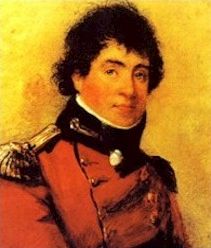Andrew Blayney, 11th Baron Blayney facts for kids
Quick facts for kids
Andrew Blayney, 11th Baron Blayney
|
|
|---|---|

Baron Blayney
|
|
| Born | 30 November 1770 County Monaghan, Ireland |
| Died | 8 April 1834 (aged 63) Dublin, Ireland |
| Allegiance | |
| Service/ |
|
| Rank | Lieutenant-General |
| Battles/wars | Napoleonic Wars |
Andrew Thomas Blayney (born November 30, 1770 – died April 8, 1834) was an important figure from Ireland. He was known as the 11th Baron Blayney. He managed his family's estate in Castleblayney, County Monaghan, for 50 years, from 1784 to 1834. He was also one of the most famous soldiers from County Monaghan.
Contents
A Brave Soldier
Andrew Blayney was a high-ranking officer in the British Army, reaching the rank of Lieutenant-General. He led a group of soldiers called the 89th (Princess Victoria's) Regiment of Foot. His soldiers were even nicknamed 'Blayney's Bloodhounds' because they were so determined.
Fighting in the Napoleonic Wars
Lord Blayney and his soldiers fought bravely in the Napoleonic Wars. These were a series of big wars between France (led by Napoleon Bonaparte) and many other European countries.
Captured in Battle
During one battle, the Battle of Fuengirola, Lord Blayney was leading a raid from Gibraltar into Spain. He was trying to attack a small group of Polish soldiers. Even though his forces were much larger, he was captured. He was held as a prisoner by the French government for four long years.
His special sword, called a sabre, is now on display in a museum in Poland. It's in the Czartoryski Museum in Kraków.
His Time as a Prisoner
While he was a prisoner, Lord Blayney wrote a book about his experiences. It was called Narrative of a Forced Journey through Spain and France as a Prisoner of War. This book shared his story of being captured and held from 1810 to 1814.
He was captured by an Irish colonel in the French army named O'Callaghan. This colonel had been involved in a rebellion in Ireland earlier. It is said that O'Callaghan wanted Lord Blayney to be held until some Irish rebels, who were in British prisons, could be set free.
Help from a Friend
During the four years Lord Blayney was a prisoner, his friend, the 2nd Earl of Caledon, helped him. The Earl took care of Lord Blayney's money, home, and even his political matters.
When Lord Blayney finally returned home, he was given a seat in the British Parliament. He represented a place called Old Sarum. This was a very old area that had very few voters but still had a Member of Parliament.
Later Life
Lord Blayney passed away on April 8, 1834. After his death, his son, Cadwallader, became the 12th and last Lord Blayney.
See also
- Baron Blayney
 | Charles R. Drew |
 | Benjamin Banneker |
 | Jane C. Wright |
 | Roger Arliner Young |

